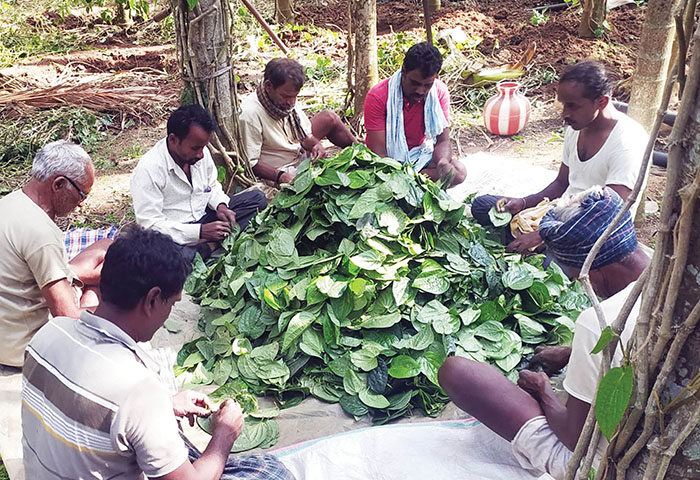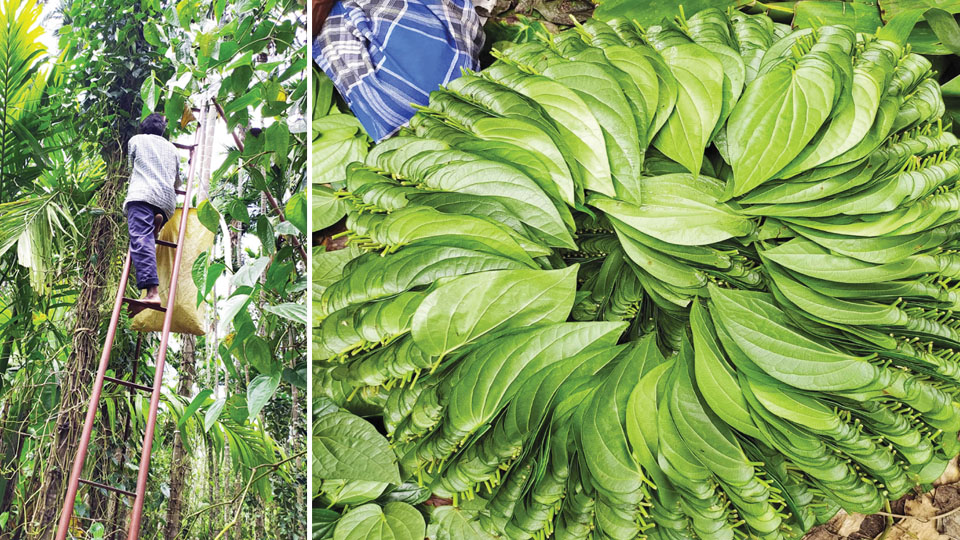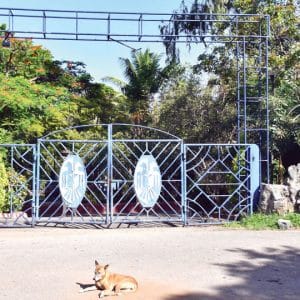Post-meal munching at a cost
The significance of betel leaves in auspicious ceremonies is profound, serving as integral components in various cultural rituals. For many, the combination of betel leaves and arecanut is not just a mere indulgence but a cherished tradition, enjoyed after meals or throughout the day.
Often referred to as the ‘poor man’s almond,’ betel nuts and leaves hold a special place in the hearts of many due to their cultural and historical significance.
Mysore betel leaves, known locally as Mysore Veelyadele, have earned global acclaim for their exceptional quality and distinctiveness. They stand out among Mysuru’s Geographical Indication (GI)-tagged products, symbolising the region’s rich heritage. Cultivated across approximately 50,000 hectares nationwide, Mysore betel leaves continue to uphold their reputation for excellence on the global stage.
While States like Madhya Pradesh, Maharashtra, Andhra Pradesh, Odisha, Bihar and West Bengal also partake in betel leaf cultivation, Mysuru stands out, commanding a staggering 75 percent share of Karnataka’s total betel leaf production.
However, recent times have witnessed a sharp increase in the price of betel leaves, especially the renowned Mysore variety. Variants such as the ‘tambula’ leaf, white leaf (‘biliyele’) and ‘chigurele’ (tender leaf) flourish in the fertile lands of Mysuru.
Steep price increase
Previously available at a modest price, the Mysore ‘tambula’ leaf, sold in bundles of 200 leaves each, has seen its cost escalate from Rs. 100 to Rs. 120 per bundle to a range of Rs. 150 to Rs. 200.
Similarly, the price of Mysore white leaf has surged from Rs. 150 to Rs. 200 to an astonishing Rs. 300 to Rs. 350 per bundle. Even Mysore ‘chigurele’, once priced at Rs. 200 to Rs. 250 per bundle, now commands prices ranging from Rs. 350 to Rs. 400. Betel leaf cultivation thrives primarily in Mysuru city, Nanjangud and Udbur, with Udbur specialising in the production of ‘tambula’ leaves.

Plantation Vs real estate
The surge in betel leaf prices can be attributed to several factors. Once, vast plantations sprawled from Poornaiah Choultry in historic Agrahara of Mysuru city to J.P. Nagar along Nanjangud Road, cultivating betel leaves across extensive acres. However, a significant portion of these plantations, amounting to 25 percent, has now been repurposed into residential areas. Countless homes now stand where lush green gardens once flourished, transforming once-verdant landscapes of betel leaf crops into concrete jungles. This conversion has significantly diminished the yield of betel leaf produce.
Moreover, diseases like leaf blight have plagued betel leaf cultivation, further diminishing yields. Weather aberrations, including droughts, exacerbate the decline in betel yields.
The ideal temperature range of 30 to 36 degrees Celsius is crucial for the optimal growth of betel leaves. However, recent years have brought severe droughts and scorching summer temperatures exceeding 40 degrees Celsius, which have negatively impacted betel leaf yields.
Labour scarcity presents another obstacle to cultivation. Skilled workers are essential for the intricate process of hand-harvesting betel leaves, as machinery cannot be utilised. Unfortunately, the shortage of skilled labourers has impeded the growth of betel nut crops.
Cultural and health benefits
Indeed, betel leaves possess not only economic importance but also profound cultural and health benefits. Heart-shaped and aesthetically pleasing, they aid in digestion when chewed with nuts after meals and contribute to enhancing immunity. Moreover, betel leaves hold immense significance in Hindu festivals and religious ceremonies, where they are regarded as essential offerings to the deities, symbolising auspiciousness. With roots deeply embedded in Indian culture since ancient times, betel leaves carry a rich mythological legacy.
According to the Skanda Purana, the betel leaf emerged from the depths of the sea during the divine churning between gods and demons, rendering it sacred in Hindu tradition.
Once affordable, the price of betel leaf has surged, with a single leaf now fetching up to Rs. 2, making it increasingly inaccessible to the less affluent, particularly the elderly who cherished its consumption.
The distinct flavour of Mysore betel leaves, nurtured in the region’s black clay soil, driving a substantial demand for Mysore betel leaves.
Recognising its exceptional quality, the Mysore betel leaf has earned global renown along with its GI tag. It is imperative to safeguard and preserve this unique crop, with its distinctive characteristics, for generations to come.
Save the leaf we cannot live without
The State Government must urgently intervene to dissuade betel leaf growers from dismantling their plantations and incentivise the establishment of new ones. Addressing the challenges encountered by betel leaf growers is paramount. Their needs and demands should be met and efforts to promote betel cultivation should be intensified. Failure to act swiftly will result in the gradual disappearance of betel plantations, replaced by residential areas. This grim trajectory could culminate in a future where children must learn about betel leaves from books or films, rather than experiencing their cultural significance first-hand.








Recent Comments